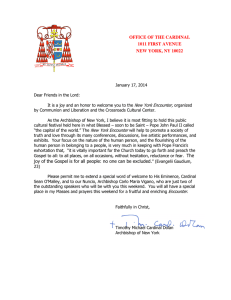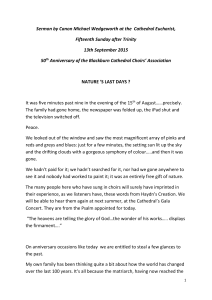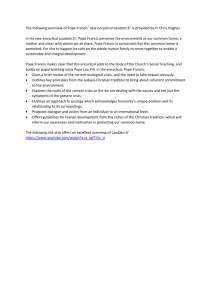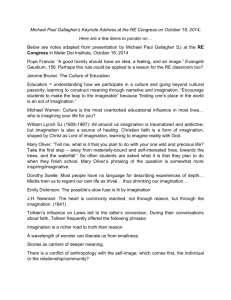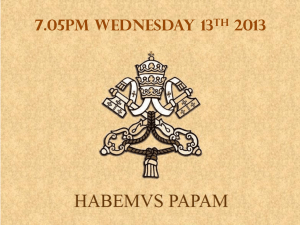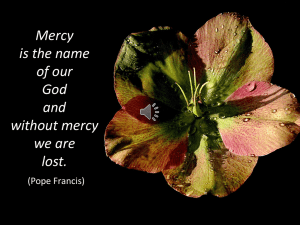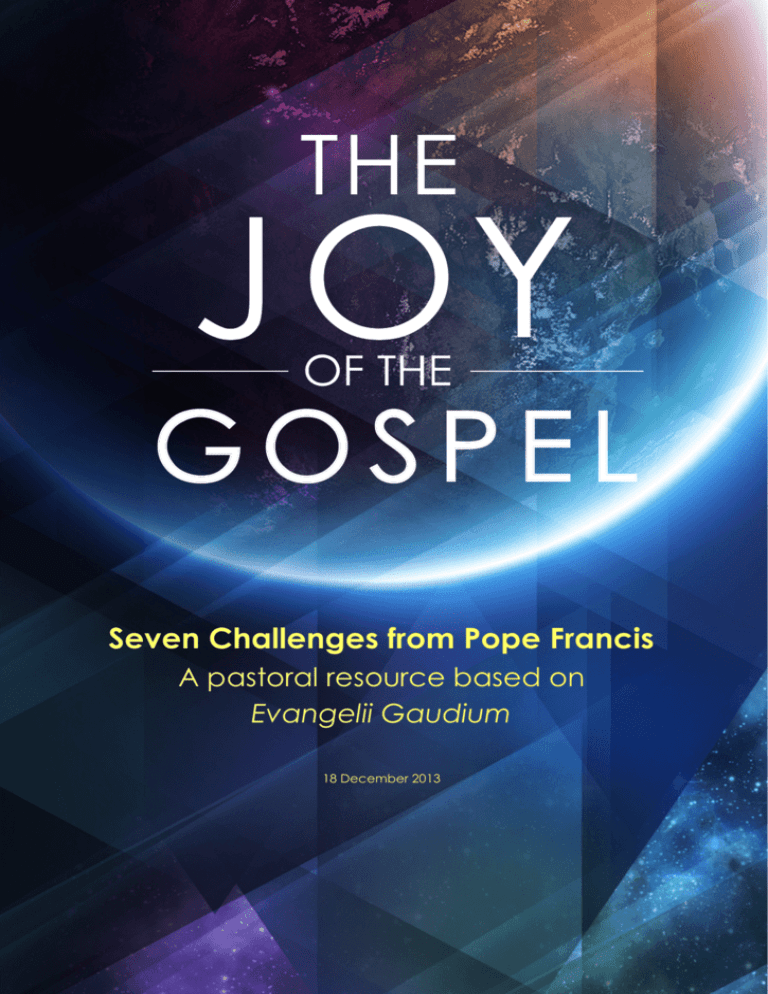
Seven Challenges from Pope Francis
A pastoral resource based on
Evangelii Gaudium
18 December 2013
This resource is published by the Catholic Diocese of Broken Bay, NSW Australia.
Text: Teresa Pirola © 2013. Design: Diocese of Broken Bay © 2013
Enquiries: Parish Support Unit | 9847 0484 | www.dbb.org.au
The quotations contained herein are from the APOSTOLIC EXHORTATION EVANGELII GAUDIUM OF THE
HOLY FATHER FRANCIS TO THE BISHOPS, CLERGY, CONSECRATED PERSONS AND THE LAY FAITHFUL ON THE
PROCLAMATION OF THE GOSPEL IN TODAY’S WORLD.
Copyright © 2013 Libreria Editrice Vaticana. All rights reserved.
Contents
Introduction
Seven challenges
1. Let us not allow ourselves to be robbed of missionary enthusiasm! (#80)
2. Let us not allow ourselves to be robbed of the joy of evangelization!
(#83)
3. Let us not allow ourselves to be robbed of hope! (#86)
4. Let us not allow ourselves to be robbed of community! (#92)
5. Let us not allow ourselves to be robbed of the Gospel! (#97)
6. Let us not allow ourselves to be robbed of the ideal of fraternal love!
(#101)
7. Let us not allow ourselves to be robbed of missionary vigour! (#109)
A closing reflection: Mission, memory & Eucharist (#11-13)
A marian prayer
A pilgrim prayer
Pope Francis’ pastoral approach
Fifty ways to live the joy of the Gospel
Quotable quotes of Pope Francis
The Joy of the Gospel
SEVEN CHALLENGES FROM POPE FRANCIS
“I dream of a ‘missionary option,’ a missionary impulse capable of transforming everything,
so that the Church’s customs, ways of doing things, times and schedules, language and
structures can be suitably channelled for the evangelization of today’s world rather than for
her self-preservation.”
(Evangelii Gaudium, #27)
Introduction
Welcome to this resource in which we invite you to ponder and respond to seven challenges
posed by Pope Francis in his apostolic exhortation, Evangelii Gaudium, released on 24
November 2013.
For a papal document, Evangelii Gaudium is remarkably reader-friendly. All of us in the
Diocese of Broken Bay are encouraged to read and apply it.
That said, it is a lengthy document and can take anywhere between 5 and 9 hours to read in
full. For this reason, and to supplement a full reading, we offer here a series of reflections
based on the document for pastoral use: e.g., for individual or small group reflection, for
homiletic ideas or bulletin inclusions.
The resource is formulated around seven bold ‘calls’ to conversion and action which thread
their way through Evangelii Gaudium. We will take each one, going behind the rallying cry,
and find out what Pope Francis is asking of our lives and of the pastoral agenda of the
Church.
Evangelii Gaudium is packed with rich themes, challenging pastoral teachings, and
‘quotable quotes’. This resource takes up a small sample as a place to start.
However don’t stop there... Go to the document itself and keeping exploring the hopes and
dreams of Pope Francis for the Church. There is so much in Evangelii Gaudium to encourage,
stimulate and challenge our Christian lives.
Links:
Access the full document at the Vatican website.
A brief synopsis can be found at Zenit.org.
Read the Australian Catholics Bishops’ statement here.
Read “The Francis Effect” (by Catholic Mission & Catholic Religious Australia) here.
The Joy of the Gospel
SEVEN CHALLENGES FROM POPE FRANCIS
1. Let us not allow ourselves to be robbed of missionary enthusiasm! (#80)
A joy ever new, a joy which is shared
See EG, 1-13
“Rejoice!” is the angel’s greeting to Mary (Lk 1:28).
Pope Francis opens his apostolic exhortation marvelling at God’s power to break into our
lives:
The joy of the Gospel fills the hearts and lives of all who encounter Jesus. Those
who accept his offer of salvation are set free from sin, sorrow, inner emptiness and
loneliness.
With Christ joy is constantly born anew. (#1)
This is a joy to be shared. It excludes no one.
I invite all Christians, everywhere, at this very moment, to a renewed personal
encounter with Jesus Christ, or at least an openness to letting him encounter
them. No one should think that this invitation is not meant for him or her... (#3)
The Holy Father urges us to believe that Jesus can break through darkness and dullness, and
“constantly amaze us by his divine creativity” (#11).
The Lord does not disappoint those who take this risk; whenever we take a step
towards Jesus, we come to realize that he is already there, waiting for us with
open arms.
How good it feels to come back to him whenever we are lost! Let me say this
once more: God never tires of forgiving us; we are the ones who tire of seeking his
mercy.
Let us not flee from the resurrection of Jesus, let us never give up, come what will.
May nothing inspire more than his life, which impels us onwards! (#3)
Reflect. Pray. Act.
Think back to a ‘first moment’ when you received that initial spark of joyful revelation. Is it still
burning? Pray that the Lord will surprise you yet again with the joy of the Gospel.
Pope Francis asks us to take a ‘risk.’ What am I risking by taking a step toward Jesus?
The Holy Father urges us to pray:
Lord, I have let myself be deceived; in a thousand ways I have shunned your love,
yet here I am once more, to renew my covenant with you. I need you. Save me
once again, Lord, take me once more into your redeeming embrace. (#3)
We need not blindly seek God, for we know that God has already spoken to us in the
Scriptures. Pope Francis wants our lives to be radically enriched by the Word of God. “The
study of Scripture must be a door opened to every believer” (#175).
To what extent do I ponder and study Scripture and allow it to influence my daily life?
The Joy of the Gospel
SEVEN CHALLENGES FROM POPE FRANCIS
2. Let us not allow ourselves to be robbed of the joy of evangelisation! (#83)
We are missionary disciples
See EG, 119-121; 48-49
To encounter Jesus is to be sent forth to proclaim him joyfully: “We have found the Messiah!”
(Jn 1:41). This is evangelisation: sharing the Good News of Jesus Christ in my life.
Pope Francis makes the point that evangelisation is not to be left to the “professionals” while
the rest of us are passive recipients. Through baptism every Christian is challenged to be
actively engaged in evangelisation, and there is a certain urgency about this calling. (See
#120)
Indeed, anyone who has truly experienced God’s saving love does not need
much time or lengthy training to go out and proclaim that love. (#120)
Think of St Paul. After his encounter with Jesus he “immediately proclaimed Jesus” (Acts 9:20).
“So what are we waiting for?” asks the Pope (#120).
Of course, all of us are called to mature in our work as evangelisers. We want to
have better training, a deepening love and a clearer witness to the Gospel.... But
that does not mean we should postpone the evangelising mission; rather each us
should find ways to communicate Jesus wherever we are. (#121)
The Holy Father appeals to that deep knowledge in every believer’s heart:
In your heart you know that it is not the same to live without him; what you have
come to realize, what has helped you to live and given you hope is what you also
need to communicate to others. Our falling short of perfection should be no
excuse; on the contrary, mission is a constant stimulus not to remain mired in
mediocrity but to continue growing. (#121)
Let us go forth to offer everyone the life of Christ. But to whom should we go first? Pope
Francis finds a clear indication in the Gospel: we are to go to the poor and the sick, those
who are usually despised and overlooked, “those who cannot repay you” (Lk 14:14). (See
#48-49)
We have to state, without mincing words, that there is an inseparable bond
between our faith and the poor. May we never abandon them. (#48)
Reflect. Pray. Act.
“So what are we waiting for?” asks the Pope. Every day we are presented with opportunities
to share Christ’s love. How often do we engage in fruitless conversations about what’s
lacking in the Church, its leaders, systems, people. Meanwhile, we could have channelled
that time and energy into practical love befitting our baptismal calling. If we all paused to
search our hearts right now, we would find there a person and situation whose poverty cries
out for our response. Remember Jesus’ words: “You give them something to eat” (Mk 6:37).
The Joy of the Gospel
SEVEN CHALLENGES FROM POPE FRANCIS
3. Let us not allow ourselves to be robbed of hope! (#86)
Take heart, have confidence, and don’t be a ‘sourpuss.’
See EG, 85-86
In some detail Pope Francis describes a serious temptation which stifles our zeal for sharing
the Good News: “a defeatism which turns us into querulous and disillusioned pessimists,
“sourpusses” (#85). We must say no to a sterile pessimism. For the joy of the Gospel belongs to
you; nothing and no one can take it from you. (See #84)
The evils of our world ― and those of the Church ― must not be excuses for
diminishing our commitment... Let us look upon them as challenges which can
help us to grow. (#84)
Nobody can go off to battle unless he is fully convinced of victory beforehand. If
we start without confidence, we have already lost half the battle and we bury our
talents. While painfully aware of our frailties, we have to march on without giving
in, keeping in mind what the Lord said to St Paul: ‘My grace is sufficient for you, for
my power is made perfect in weakness’ (2 Cor 12:9). (#85)
The Holy Father understands that at times our experience of life―our family, parish,
workplace, society ― can seem like a desert. But the desert can also be a place of thirsting
for God.
In the desert we rediscover the value of what is essential for living... And in the
desert people of faith are needed who, by the example of their lives, point the
way to the Promised Land and keep hope alive… We are called to be living
sources of water…
At times, this becomes a heavy cross, but it was the cross, from his pierced side,
that our Lord gave himself to us as a source of living water. (#86).
Reflect. Pray. Act.
Bring to prayer a time in your life when ‘joy in the Lord’ welled up with ease, and another
time when it was born of deep trust like a tiny flame in the dark. Let the Lord speak to your
heart.
Am I tempted to give in, to be a ‘sourpuss’? Do I really believe that Christ’s love is ultimately
victorious? In what ways can I be ‘living water’ in a spiritually parched environment?
Choose a scripture verse that gives voice to your experience of ‘joy in the Lord.’ (There are
20 examples in #4-5). Commit it to memory and pray it in your heart as you go about your
week.
Pope Francis acknowledges that grief is also part of life. He understands the grief of people
who endure great suffering. “Yet slowly but surely we all have to let the joy of faith slowly
revive as a quiet yet firm trust, even amid the greatest distress: ‘My soul is bereft of peace; I
have forgotten what happiness is...But this I call to mind, and therefore I have hope: the
steadfast love of the Lord never ceases, his mercies never come to an end...’ (Lam 3:17,2123,26).” (#6)
The Joy of the Gospel
SEVEN CHALLENGES FROM POPE FRANCIS
4. Let us not allow ourselves to be robbed of community! (#92)
‘Yes’ to the new relationships brought by Christ
See EG, 87-92
Pope Francis acknowledges the challenges posed by today’s extraordinary advances in
human communications which is like stepping into “a flood tide” of opportunities to mingle
and encounter, embrace and support one another. While chaotic, these greater possibilities
for communication can become “a genuine experience of fraternity, a caravan of solidarity,
a sacred pilgrimage” (#87).
At the same time we must resist the temptation to isolate ourselves, to escape and take
refuge in the comfort of our privacy, desiring interpersonal relationships provided by
sophisticated equipment, by screens and systems which can be switched on and off on
command. (See #88)
The Gospel tells us constantly to run the risk of a face-to-face encounter with
others, with their physical presence which challenges us, with their pains and
pleas, with their joy which infects us in our close and continuous interaction. (#88)
Our faith, says the Holy Father, is not in a disembodied Jesus but in Jesus who cannot be
separated from community, from service, from reconciliation with others. “The Son of God, by
becoming flesh, summoned us to the revolution of tenderness” (#88).
Let us not be believers who seek “to hide or keep apart from others, or quietly flit from one
place or task to another, without creating deep and stable bonds.” Sharing the Good News
means “learning to find Jesus in the faces of others, in their voices, in their pleas” (#91).
Reflect. Pray. Act.
Our communities are to be the salt of the earth and the light of the world (cf. Mt 5:13-16).
(See #92) Reflect on the quality of your relationships. In what subtle ways might I prefer
superficiality to the depths of the Gospel?
Does my “relationship with money” control my life and relationships? Does “the culture of
prosperity” deaden me? (See #53-56)
In what ways are my relational circles outreaching, inclusive, and fruitful in sharing the joy of
Christ? Together are we reaching out to heal the pain of this world, or are we ‘closed in’? Is
my home, my parish, my community a place of inclusion and generosity?
The Pope sees genuine forms of popular religiosity as helping to foster relationships, because
they entail a personal relationship, not with vague spiritual energies but with God, with Christ,
with Mary, with the saints. “These devotions are fleshy, they have a face” (#90).
Think about your religious practices and customs that give expression to your spirituality. Are
they ‘fleshy’? Do they have ‘a face’? Do they foster a genuine encounter with real persons?
The Joy of the Gospel
SEVEN CHALLENGES FROM POPE FRANCIS
5. Let us not allow ourselves to be robbed of the Gospel! (#97)|
‘No’ to spiritual worldliness
See EG, 93-97
Pope Francis addresses another serious temptation for Christians: spiritual worldliness. He
views this as a tremendous corruption, disguised as a good. It “hides behind the appearance
of piety and even love for the Church” (#93), when in fact it really consists in serving my own
interests, not those of Christ.
This insidious worldliness can take many forms. In some people and groups it is expressed as
“an ostentatious preoccupation for the liturgy, for doctrine and for the Church’s prestige, but
without concern that the Gospel have a real impact on God’s faithful people and the
concrete needs of the present time… The life of the Church turns into a museum piece...”
(#95).
“In others, this spiritual worldliness lurks behind a fascination with social and political gain, or
pride in their ability to manage practical affairs, or an obsession with programs of self help
and self-realization” (#95).
It can translate into “a social life full of appearances, meetings, dinners, receptions. It can
also lead to a business mentality, caught up with management, statistics, plans and
evaluations” which in the end serve not God but institutions. “The mark of Christ, incarnate,
crucified and risen, is not present” (#95).
In all these examples, closed and elite groups are formed. Looking down from on high, they
constantly point out the mistakes of others, while discrediting those who raise questions.
Meanwhile the multitudes thirst for Christ. (See #95-97)
“God save us from a worldly Church with superficial spiritual and pastoral trappings!” (#97)
The Pope is convinced that “this stifling worldliness can only be healed by breathing in the
pure air of the Holy Spirit who frees us from self-centredness” (#97). He urges us as a Church
to constantly go out from ourselves, focused on Jesus and on our commitment to the poor.
Reflect. Pray. Act.
The Holy Father writes: “I prefer a Church which is bruised, hurting and dirty because it has
been out on the streets, rather than a Church which is unhealthy from being confined and
from clinging to its own security” (#49).
Take this challenge to heart. Perhaps there are times when I feel very much part of this
Church which is ‘bruised, hurting, dirty.’ Perhaps there are other times when I stand aloof
from people’s lives. In my ‘shepherding’ role I resist “taking on the smell of the sheep” (#24)
and I am in some way complicit in the stagnation of my community (e.g., parish,
neighbourhood).
Take the Pope’s challenges as the basis of an examination of conscience prior to receiving
the sacrament of reconciliation. What specific changes will I make to my attitudes and
behaviour?
The Joy of the Gospel
SEVEN CHALLENGES FROM POPE FRANCIS
6. Let us not allow ourselves to be robbed of the ideal of fraternal love! (#101)
‘No’ to warring among ourselves
See EG, 98-101, 115-18
Pope Francis laments the sad reality that our world is being torn apart by wars and violence.
Tragically, we Christians are part of the problem:
How many wars take place within the people of God…! In our neighbourhoods
and in the workplace, how many wars are caused by envy and jealousy, even
among Christians! (#98)
Beware of the temptation of jealousy! We are all in the same boat and headed
to the same port! Let us ask for the grace to rejoice in the gifts of each, which
belong to all. (#99)
The Holy Father describes evangelisation in terms of joyfully acknowledging the varied
treasures which the Holy Spirit pours out upon the Church, in cultural diversity and in many
different charisms. Such variety of culture and charism, integrated into the whole ecclesial
body, can renew and build up the Church. These are great treasures! (See #115-118)
“Differences between persons and communities can sometimes prove uncomfortable,” yet
from all this diversity the Holy Spirit can bring unity and an attractive means of evangelisation.
(See #131).
It always pains me greatly to discover how some Christian communities, and even
consecrated persons, can tolerate…enmity, division, calumny, defamation,
vendetta, jealousy and the desire to impose certain ideas at all costs, even
persecutions which appear as veritable witch hunts. Whom are we going to
evangelize if this is the way we act? (#100)
Let us ask the Lord to help us understand the law of love. How good it is to have
this law! How much good it does to love one another, in spite of everything. Yes,
in spite of everything! (#101)
St Paul’s words are for each of us: “Do not be overcome by evil, but overcome evil with
good” (Rom 12:21).
Reflect. Pray. Act.
Pope Francis assigns us some practical homework for healing conflict:
We all have our likes and dislikes, and perhaps at this very moment we are angry
with someone. At least let us say… ‘Lord, I am angry with this person. I pray for
him, for her.’ This is a beautiful step forward in love…an act of evangelization. Let
us do it today! (#101)
The Pope also highlights two powerful bible verses at the core of Christian identity (#99):
“By this everyone will know that you are my disciples, if you have love for one another” (Jn
13:35). And Jesus’ heartfelt prayer to the Father: “That all may be one…in us… so that the
world may believe” (Jn 27:21). Place these verses at the centre of your next parish planning
meeting.
The Joy of the Gospel
SEVEN CHALLENGES FROM POPE FRANCIS
7. Let us not allow ourselves to be robbed of missionary vigour! (#109)
The entire people of God proclaims the GospelSee EG, 111-114, 174-175, 270, 284, 288
Pope Francis describes the Church as a pilgrim people:
The Church...is more than an organic and hierarchical institution: she is first and
foremost a people advancing on its pilgrim way towards God. She is certainly a
mystery rooted in the Trinity, yet she exists concretely in history as a people of
pilgrims and evangelizers, transcending any institutional expression, however
necessary. (#111)
Salvation is always the free gift and initiative of God, “who loved us first” (1 Jn 4:19). It is never
something we can earn or bring about by human effort alone. (See #112)
God offers salvation to everyone, not as isolated individuals but through calling together a
people. Being Church means being God’s people. To those who feel far from God and the
Church, the Holy Father writes:
I would like to say this: the Lord, with great respect and love, is also calling you
to be part of his people! (#113)
To be God’s people is to be “God’s leaven in the midst of humanity” (#114).
Sometimes we are tempted to be that kind of Christian who keeps the Lord’s
wounds at arm’s length. Yet Jesus wants us to...touch the suffering flesh of others.
He hopes that we will stop looking for those personal or communal niches which
shelter us from the maelstrom of human misfortune and instead enter into the
reality of other people’s lives and know the power of tenderness. Whenever we
do so our lives become wonderfully complicated and we experience intensely
what it is to be a people... (#270)
Mary is always present amidst the people. Pope Francis draws us to the person of Mary in
whom we are given a powerful model of the interplay of justice and tenderness, of
contemplation and concern for others. By looking to her “we come to believe once again in
the revolutionary nature of love and tenderness” (#288; see #284).
Reflect. Pray. Act.
Think of those key relationships through which you belong to God’s people, the Church.
Share something of how your life as part of the people of God is “wonderfully complicated”!
In what ways do you encounter the ‘the Lord’s wounds,’ ‘the suffering flesh of others’?
Pope Francis dwells upon passages which depict Mary as a woman of contemplation (Lk
2:19), of service (Lk 1:39), and as a woman in pursuit of justice (Lk 1:52-53). Spend time with
these passages. Join with the Holy Father in seeking Mary’s intercession. (See #288).
The Joy of the Gospel
SEVEN CHALLENGES FROM POPE FRANCIS
Mission, memory & Eucharist
See EG, 11-13
Memory is essential to our faith experience. Pope Francis offers a beautiful reflection on how
the joy of evangelisation arises from grateful remembrance:
The apostles never forgot the moment when Jesus touched their hearts: ‘It was
about four o’clock in the afternoon’ (Jn 1:39).
Grateful remembrance...is a grace which we constantly need to implore. (#13)
It is true, writes the Pope, that every form of authentic evangelisation is always new. Christ,
the “eternal Gospel” (Rev 14:6) is the source of all newness. (See #11).
However the newness which God brings about and which feeds our Christian mission is not
“a displacement or forgetfulness of the living history which surrounds us and carries us
forward...”
The believer is essentially ‘one who remembers’ (#13).
The memory of the believer finds intense expression in the celebration of the Eucharist which
Jesus leaves us as “the Church’s daily remembrance of, and deeper sharing in, the event of
his Passover. (cf. Lk 22:19)” (#13).
Reflect. Pray. Act.
As Christians, our ‘memory’ contains the joyful realization that the liberating hand of God has
been at work time and again in history―definitively so in the Christ-event―and that the Lord’s
saving power will continue to unfold in history.
In what ways do I draw deeply on this memory in my life as a believer? Do I approach each
Eucharist as our prayer of “grateful remembrance” which sends us forth in mission?
Ask the Lord for the grace of “grateful remembrance.” Take stock of the blessings of each
day. Let this wellspring of gratitude be healing balm on the wounds which are also part of
life.
Teach others, perhaps a child, to establish a daily habit of thanksgiving, even amidst
suffering. Let this lead to explaining why we celebrate Eucharist as a Church, and how it
sends us forth to offer hope to the world.
When I consider the wonders that God has (a) done for me personally, and (b) for us as the
people of God, what springs to mind?
Bring your ‘whole self’ to your parish Eucharistic celebration each Sunday. Let your personal
memories of God’s action in your life flow into the great river of memory which flows through
our religious tradition. May our grateful remembrance give rise to Easter joy, a joy to shared!
We seek Mary’s intercession
Mary, Virgin and Mother,
you who, moved by the Holy Spirit,
welcomed the word of life
in the depths of your humble faith:
as you gave yourself completely to the Eternal One,
help us to say our own “yes”
to the urgent call, as pressing as ever,
to proclaim the good news of Jesus.
Filled with Christ’s presence,
you brought joy to John the Baptist,
making him exult in the womb of his mother.
Brimming over with joy,
you sang of the great things done by God.
Standing at the foot of the cross
with unyielding faith,
you received the joyful comfort of the resurrection,
and joined the disciples in awaiting the Spirit
so that the evangelizing Church might be born.
Obtain for us now a new ardour born of the resurrection,
that we may bring to all the Gospel of life
which triumphs over death.
Give us a holy courage to seek new paths,
that the gift of unfading beauty
may reach every man and woman.
Virgin of listening and contemplation,
Mother of love, Bride of the eternal wedding feast,
pray for the Church, whose pure icon you are,
that she may never be closed in on herself
or lose her passion for establishing God’s kingdom.
Star of the new evangelization,
help us to bear radiant witness to communion,
service, ardent and generous faith,
justice and love of the poor,
that the joy of the Gospel
may reach to the ends of the earth,
illuminating even the fringes of our world.
Mother of the living Gospel,
wellspring of happiness for God’s little ones,
pray for us.
Amen. Alleluia!
Pope Francis: Evangelii Gaudium, #288
A prayer for the pilgrim people of God
based on Pope Francis’ Apostolic Exhortation, Evangelii Gaudium
With Pope Francis we pray
Almighty God and loving Father, we come before you as a Christian community with these
petitions and resolutions inspired by the teaching of Pope Francis.
Leader: Let us not allow ourselves to be robbed of missionary enthusiasm! (#80)
All:
We say yes to a missionary spirituality that shapes our way of life. (See #27)
L:
Let us not allow ourselves to be robbed of the joy of sharing the Good News! (See
#83)
All:
We resist “the gray pragmatism of church life.” We ask the Lord to heal our inner
weariness and fill us with zeal for the Good News. (See #83, 27)
L:
Let us not allow ourselves to be robbed of hope! (#86)
All:
We refuse to be prophets of doom, for we know that the Lord’s love is steadfast and
the Holy Spirit radiates in the midst of darkness. Lord, strengthen our hope! (See #84)
L:
Let us not allow ourselves to be robbed of community! (#92)
All:
We refuse to flee from the challenges of loving each other. Lord, help us not to
become ‘closed in’ by the comfort of our privacy or our ‘inner circle’. (See #98, 27)
L:
Let us not allow ourselves to be robbed of the Gospel! (#97)
All:
We refuse the corruption of spiritual worldliness. Lord, send us forth to others: in
community, in service, in reconciliation, and in a ‘revolution of tenderness.’ (See
#93, 88)
L:
Let us not allow ourselves to be robbed of the ideal of fraternal love! (#101)
All:
We embrace the law of love. Lord, help us to love, in spite of everything. (See#101)
L:
Let us not allow ourselves to be robbed of missionary vigour! (#109)
All:
We trust in God’s love, even amidst suffering. Lord, help us to be realists, yes; but
without losing our joy, our boldness and our hopefilled commitment to you and your
people. (See #109)
L: We make this prayer through Jesus Christ your Son, and in the Holy Spirit.
All: Amen!
Mary, star of the new evangelisation. Pray for us.
Mother of the living Gospel. Pray for us
Mary, wellspring of happiness for God’s little ones. Pray for us.
Amen. Alleluia! (#288)
This page could form the basis of a discussion by a pastoral leadership team.
Pope Francis’ pastoral approach
It is often observed that Pope Francis has a certain style of pastoring, one which cuts through
the ‘church-speak’ and moves people to think and act in fresh ways.
Much of this approach is expressed by his own modelling of simple actions which are loving
and humble (e.g., embracing a disfigured man, relinquishing certain papal ‘trappings,’
carrying his own briefcase, his grandfatherly interaction with a 6 year old boy intent on
sharing the stage with the pope).
There is a lesson here about the powerful impact one person can have simply by doing small
things in a gospel way. Granted, he is the Pope. People sit up and take notice! Yet we all
have a sphere of influence where the example we set is noticed and influences others: our
parishioners, our work colleagues, our students, our neighbours, our spouse, and (most
especially) our children.
Pope Francis’ approach as a pastor is also evident in his homilies, addresses, writings. Not
uncommonly he interrupts his homiletic flow to suggest a concrete prayer or action to his
audience: something to do, words to say, things which are small in themselves but which
cumulatively can have a profound impact on the shape of one’s Christian lifestyle.
In Evangelii Gaudium, for instance, Pope Francis gently pushes us through our reluctance to
repent by suggesting words we could say to Jesus (#3). He has us take a step in healing
broken relationships by asking us to think of a person we dislike and to pray for that person
‘today,’ while giving us actual words to pray (#101). He frequently draws upon concrete
imagery and popular phrases to communicate his point in a direct way. As one
commentator noted, this is surely the first time the term “sourpuss” (#85) has entered the
vocabulary of a papal document!
“The document is geared essentially to action,” said the Australian Catholic Bishops
Conference in a statement about Evangelii Gaudium. “That is why the bishops are keen for it
to be known as widely as possible. “We need action―in our own lives, in the Church and in
society as a whole.”
The Australian Bishops also noted that “there is much in what the Pope writes that is
challenging, especially to us as Bishops. We will read and re-read his words as an
examination of conscience. Much of what the Holy Father writes goes to the heart of our
episcopal ministry, and we cannot ignore it. In it, we hear the voice of Christ.”
They continued: “The same voice speaks to the whole Church. We ask all the baptised to
listen to what the Pope has said, that we may together hear more deeply the voice of Christ.
[The Pope’s words] come as deep encouragement. We want that encouragement and the
refreshment it brings to go forth far and wide.”
In our own diocese of Broken Bay, let us do all we can to spread far and wide that
encouragement brought by Pope Francis’ Evangelii Gaudium.
In the spirit of Pope Francis’ joyful and action-oriented pastoral approach, here are:
Fifty ways to live the Joy of the Gospel
1.
Hold or touch a cross, take a deep breath, and say ‘yes’ to living this day with hope.
2.
Start and end each day with a prayer of praise.
3.
Be grateful for a difficult challenge. How is the Lord teaching you?
4.
During the Easter season, throw a resurrection party.
5.
Extend a hand in friendship to a little-known neighbour.
6.
Take a walk in the park and allow God to speak to you through nature: sunshine, an
evening breeze, the sounds of children playing.
7.
Romance your spouse.
8.
Congratulate a newly baptised Christian.
9.
Welcome God’s gift of life. Rejoice in a friend’s pregnancy.
10.
Say thank you to those who work hard for your parish, for your local community, for
your nation
11.
Break the gossip cycle. Let the nasty rumour stop with me. Or if you must gossip, start
a positive (and truthful) rumour! In other words, spread joy not angst.
12.
Take a joy-filled Scripture verse and ‘chew’ on it during the day. (Evangelii Gaudium
offers examples from both Testaments in #4-5.)
13.
Pray at the grave of a loved one. Reaffirm your belief in the gift of eternal life.
14.
Ponder the miracle of new life. Gaze upon a newborn baby. Let your contemplative
gaze draw you into the heart of God.
15.
Look for an opportunity to genuinely affirm a family member’s appearance.
16.
Who is the most joyful person you know? Tell them. ‘Catch’ their joy, and spread it!
17.
Who has loved you over the years but never heard you say ‘I love you.’ Say it (or write
it) today.
18.
Be prolife. At Mass, offer a supportive smile for young couples with fidgety children.
Check on an elderly neighbour, especially during a storm or in heatwave conditions.
19.
Undertake a thankless task at home or in the parish which is usually left to somebody
else.
20.
Turn off the TV or radio, close down your computer, iphone, ipad... and be more
present to your family.
21.
Get in touch with your local neighbourhood. Walk to the shops instead of driving. It’s
amazing what you will notice as you stroll along at street level.
22.
Take your pulse and ponder the gift of life pulsing through your body.
23.
Organise a memorable family meal. Invite a guest who doesn’t have a family to turn
to.
24.
Go to the Eucharist in your lunch hour. Invite a colleague.
25.
Make a memory. Teach your children a game you played ‘when you were young’!
26.
Pray the rosary. But slow down your praying! Linger over the rich biblical imagery that
the rosary leads you to contemplate.
27.
Increase the ‘joy’ level at home. Be quick to praise and slow to criticise. Choose to be
enthusiastic when you least feel like it.
28.
Lighten up. Laugh a little more. Rejoice in the divine sense of hunour.
29.
Pinpoint a ‘grey’ area that is blocking your Easter joy. Name it. Fear? Loneliness?
Sometimes just accurately identifying our burdens can help take the ‘sting’ out of
them.
30.
Unburden your heart. Release a grudge you harbour. Deepen this healing by
receiving the Sacrament of Reconciliation.
31.
In Scripture, when a messenger of God announces a great joy it is often
accompanied by ‘Do not be afraid.’ Ponder this connection, and what it means for
your life.
32.
Read the story of a saint who inspires you to live life at greater heights of gospel
awareness.
33.
Treasure your freedom. Visit or write to someone in prison.
34.
Pick up the phone and speak some encouraging words to someone who could really
use them.
35.
This week, greet others with stronger handshakes, warmer hugs, more welcoming
words.
36.
Help a person who is struggling to inject some order into life. If nothing else, help to
tidy up their desk or house as a way of clearing their vision of what has to happen
next.
37.
Revel in the variety of the gifts, charisms and cultural expressions of the body of Christ.
Ask somebody who is very different to you for their viewpoint on an important issue.
38.
Slow down enough to allow the ‘slower’ person to reveal his/her goodness and gifts.
Take the time to listen to this person’s story, hopes and anxieties.
39.
Review your weekly spending on non-essentials and take steps to simplify your
lifestyle. Give gifts which are simple and which express the generosity of your heart
rather than the capacity of your bank balance.
40.
Ask yourself not just: Do I give to the poor? But: Do I have friends who are poor? Are
my social circles inclusive, or do they subtly exclude certain people?
41.
If you are in the process of making an important financial decision, read Evangelii
Gaudium as part of your discernment and decision-making processes.
42.
Do something to stimulate your creativity for God’s kingdom. Chat with motivating
people. Read the story of a saint. Play uplifting Christian music.
43.
Choose one of your dreams about changing the world for the better and break it into
achievable, bite-size chunks. Take your first bite this week!
44.
Don’t be overwhelmed by the darkness. In your work for justice and the common
good, celebrate each success no matter how small.
45.
Be attentive to injustices as they occur in the home, in the workplace, and ‘speak up’
appropriately, lovingly, firmly.
46.
Is there a parish ministry that needs to be initiated or supported, and to which you
could lend your time and talents? Take the first step today.
47.
Be politically active on matters of human dignity. Write a constructive letter to your
local MP; promote a petition; join a political party.
48.
Be ready to respond to everyday opportunities to discuss matters of faith with nonbelievers and with believers of other faith traditions, perhaps in response to media
stories or world events.
49.
Invite Our Lady to be a special companion, sister, mother to you. With Mary, ponder a
matter in your heart. It might be a situation of great disturbance, or an event of great
happiness. Either way, the Lord is to be found in the depths of this suffering, this joy.
50.
Pray for peace each time you receive the Eucharist, the sacrament of unity.
Perhaps this list will stimulate your journey of conversion and outreach.
Perhaps it will move you to compile your own list, tailored to your specific circumstances and
personal challenges. This could also be done as a family, or as a small community.
Living the Gospel is a great joy, and a great challenge; one which we undertake day by
day, step by step.
Strength to your journey!
Quotable quotes of Pope Francis
for promoting Evangelii Gaudium
“The Gospel, radiant with the glory of Christ’s cross, constantly invites us to rejoice.
‘Rejoice!’ is the angel’s greeting to Mary (Lk 1:28). Mary’s visit to Elizabeth makes John
leap for joy in his mother’s womb (cf. Lk 1:41). In her song of praise, Mary proclaims: ‘My
spirit rejoices in God my Saviour’ (Lk 1:47)... Consequently, an evangelizer must never look
like someone who has just come back from a funeral!”
Evangelii Gaudium, ‘The Joy of the Gospel’ (#5, 10). Access this document at
www.vatican.va. See also, our diocesan resource at www.dbb.org.au
“An evangelizer must never look like someone who has just come back from a funeral!
Let us recover and deepen our enthusiasm, that ‘delightful and comforting joy of
evangelizing, even when it is in tears that we must sow… And may the world of our time,
which is searching, sometimes with anguish, sometimes with hope, be enabled to receive
the good news not from evangelizers who are dejected, discouraged, impatient or
anxious, but from ministers of the Gospel whose lives glow with fervour, who have first
received the joy of Christ’ [quoting Pope Paul VI].”
Evangelii Gaudium, ‘The Joy of the Gospel’ (#10). Access this document at
www.vatican.va. See also, our diocesan resource at www.dbb.org.au
“Though it is true that this mission demands great generosity on our part, it would be
wrong to see it as a heroic individual undertaking, for it is first and foremost the Lord’s
work, surpassing anything which we can see and understand. This conviction enables us
to maintain a spirit of joy in the midst of a task so demanding and challenging that it
engages our entire life. God asks everything of us, yet at the same time he offers
everything to us.”
Evangelii Gaudium, ‘The Joy of the Gospel’ (#12). Access this document at
www.vatican.va. See also, our diocesan resource at www.dbb.org.au
“An evangelizing community gets involved by word and deed in people’s daily lives; it
bridges distances, it is willing to abase itself if necessary, and it embraces human life,
touching the suffering flesh of Christ in others. Evangelizers thus take on the ‘smell of the
sheep’ and the sheep are willing to hear their voice.”
Evangelii Gaudium, ‘The Joy of the Gospel’ (#24). Access this document at
www.vatican.va. See also, our diocesan resource at www.dbb.org.au
“One of the more serious temptations which stifles boldness and zeal is a defeatism which
turns us into querulous and disillusioned pessimists, ‘sourpusses’. Nobody can go off to
battle unless he is fully convinced of victory beforehand. If we start without confidence,
we have already lost half the battle and we bury our talents. While painfully aware of our
own frailties, we have to march on without giving in, keeping in mind what the Lord said
to Saint Paul: ‘My grace is sufficient for you, for my power is made perfect in weakness’ (2
Cor 12:9).”
Evangelii Gaudium, ‘The Joy of the Gospel’ (#85). Access this document at
www.vatican.va. See also, our diocesan resource at www.dbb.org.au
The Pope identifies as a great threat to the spread of the Gospel: “‘the gray pragmatism
of the daily life of the Church, in which all appears to proceed normally, while in reality
faith is wearing down and degenerating into small-mindedness’ [quoting Cardinal
Ratzinger, 1996]. A tomb psychology thus develops and slowly transforms Christians into
mummies in a museum. Called to radiate light and communicate life, in the end they are
caught up in things that generate only darkness and inner weariness, and slowly
consume all zeal for the apostolate. I repeat: Let us not allow ourselves to be robbed of
the joy of evangelization!”
Evangelii Gaudium, ‘The Joy of the Gospel’ (#83). Access this document at
www.vatican.va. See also, our diocesan resource at www.dbb.org.au
“The joy of the Gospel is such that it cannot be taken away from us by anyone or
anything (cf. Jn 16:22). The evils of our world – and those of the Church – must not be
excuses for diminishing our commitment and our fervour. Let us look upon them as
challenges which can help us to grow. With the eyes of faith, we can see the light which
the Holy Spirit always radiates in the midst of darkness, never forgetting that ‘where sin
increased, grace has abounded all the more’ (Rom 5:20). Our faith is challenged to
discern how wine can come from water and how wheat can grow in the midst of
weeds.”
Evangelii Gaudium, ‘The Joy of the Gospel’ (#84). Access this document at
www.vatican.va. See also, our diocesan resource at www.dbb.org.au
“I prefer a Church which is bruised, hurting and dirty because it has been out on the
streets, rather than a Church which is unhealthy from being confined and from clinging to
its own security.”
Evangelii Gaudium, ‘The Joy of the Gospel’ (#49). Access this document at
www.vatican.va. See also, our diocesan resource at www.dbb.org.au
“Just as the commandment ‘Thou shalt not kill’ sets a clear limit in order to safeguard the
value of human life, today we also have to say ‘thou shalt not’ to an economy of
exclusion and inequality. Such an economy kills.
How can it be that it is not a news item when an elderly homeless person dies of
exposure, but it is news when the stock market loses two points? This is a case of
exclusion. Can we continue to stand by when food is thrown away while people are
starving? This is a case of inequality.
Today everything comes under the laws of competition and the survival of the fittest,
where the powerful feed upon the powerless. Masses of people find themselves
excluded and marginalized: without work, without possibilities, without any means of
escape.”
Evangelii Gaudium, ‘The Joy of the Gospel’ (#53). Access this document at
www.vatican.va. See also, our diocesan resource at www.dbb.org.au
“Money must serve, not rule! The Pope loves everyone, rich and poor alike, but he is
obliged in the name of Christ to remind all that the rich must help, respect and promote
the poor. I exhort you to generous solidarity and to the return of economics and finance
to an ethical approach which favours human beings.”
Evangelii Gaudium, ‘The Joy of the Gospel’ (#58). Access this document at
www.vatican.va. See also, our diocesan resource at www.dbb.org.au
“Challenges exist to be overcome! Let us be realists, but without losing our joy, our
boldness and our hope-filled commitment. Let us not allow ourselves to be robbed of
missionary vigour!”
Evangelii Gaudium, ‘The Joy of the Gospel’ (#109). Access this document at
www.vatican.va. See also, our diocesan resource at www.dbb.org.au
“Pastoral ministry in a missionary style is not obsessed with the disjointed transmission of a
multitude of doctrines to be insistently imposed. When we adopt a pastoral goal and a
missionary style which would actually reach everyone without exception or exclusion, the
message has to concentrate on the essentials, on what is most beautiful, most grand,
most appealing and at the same time most necessary. The message is simplified, while
losing none of its depth and truth, and thus becomes all the more forceful and
convincing.”
Evangelii Gaudium, ‘The Joy of the Gospel’ (#35). Access this document at
www.vatican.va. See also, our diocesan resource at www.dbb.org.au
“Among the vulnerable for whom the Church wishes to care with particular love and
concern are unborn children, the most defenceless and innocent among us... Frequently,
as a way of ridiculing the Church’s effort to defend their lives, attempts are made to
present her position as ideological, obscurantist and conservative. Yet this defence of
unborn life is closely linked to the defence of each and every other human right. It
involves the conviction that a human being is always sacred and inviolable, in any
situation and at every stage of development. Human beings are ends in themselves and
never a means of resolving other problems.”
Evangelii Gaudium, ‘The Joy of the Gospel’ (#213). Access this document at
www.vatican.va. See also, our diocesan resource at www.dbb.org.au
“We hold the Jewish people in special regard because their covenant with God has
never been revoked... (Rom 11:29). The Church...looks upon the people of the covenant
and their faith as one of the sacred roots of her own Christian identity (cf. Rom 11:16-18).
As Christians, we cannot consider Judaism as a foreign religion... With them, we believe in
the one God who acts in history, and with them we accept his revealed word.”
Evangelii Gaudium, ‘The Joy of the Gospel’ (#247). Access this document at
www.vatican.va. See also, our diocesan resource at www.dbb.org.au

